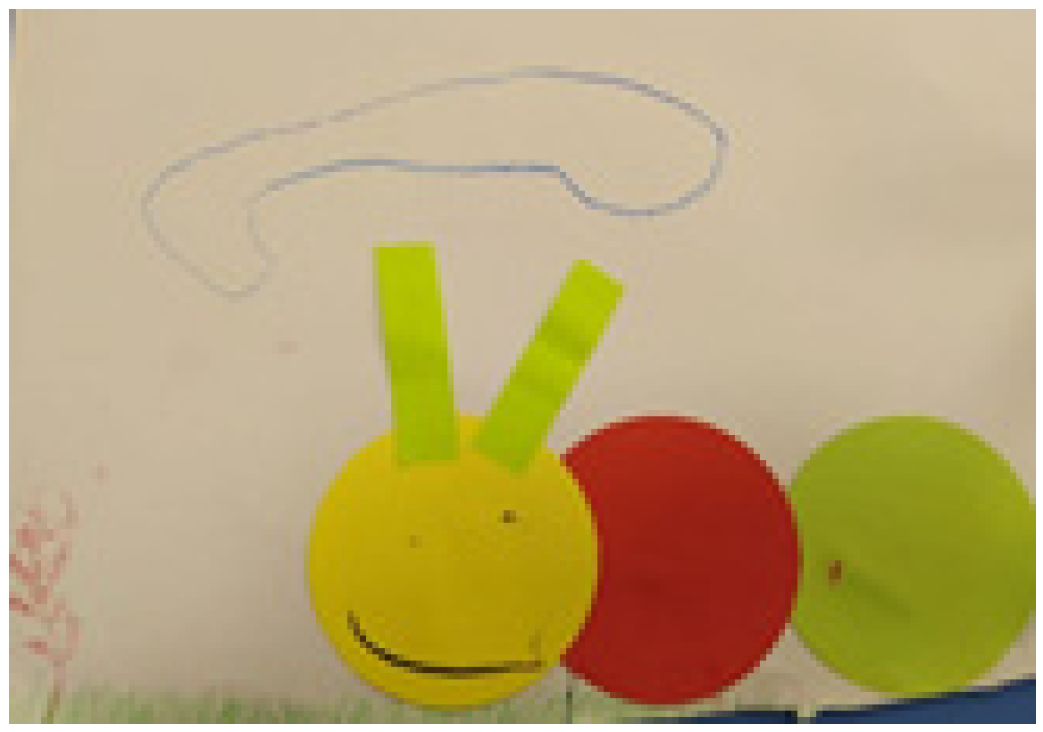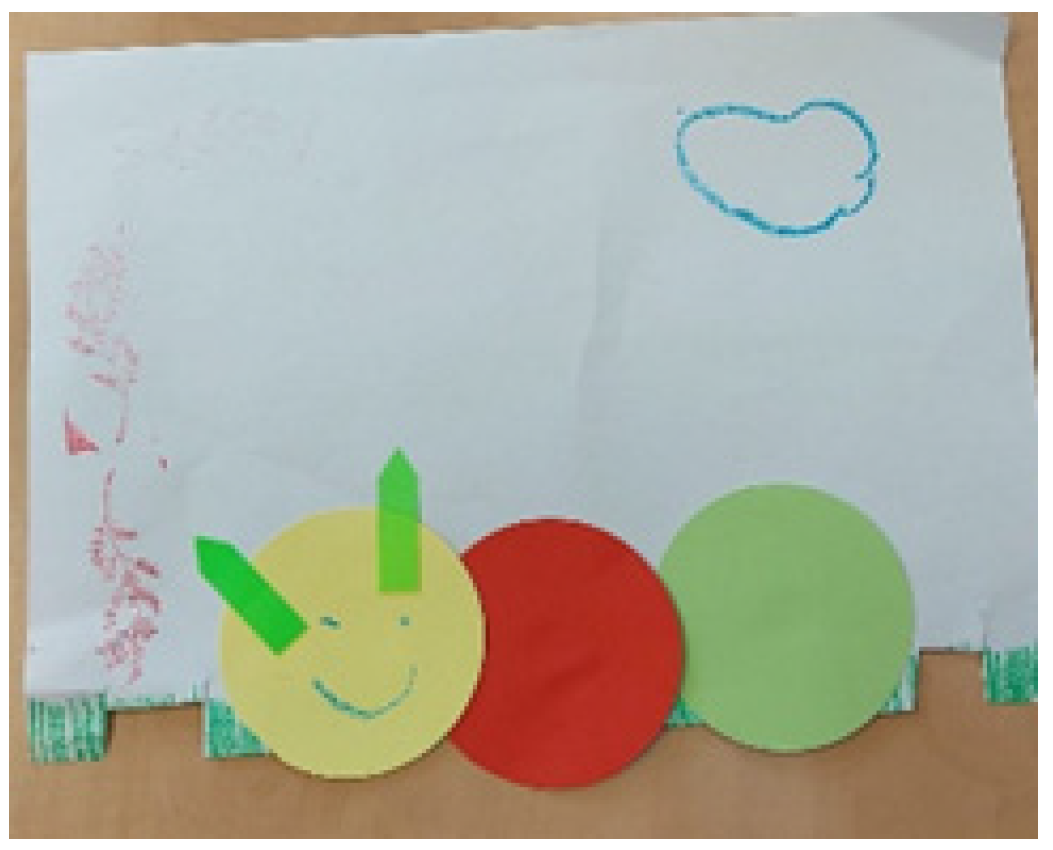Executive Function in Young Children: Validation of the Preschool Executive Task Assessment
Abstract
1. Introduction
2. Materials and Methods
2.1. Participants
2.2. Procedure
2.3. Instruments
2.3.1. Wechsler Intelligence Scale for Children–Revised 95
2.3.2. Child Evaluation Checklist
2.3.3. Preschool Executive Task Assessment
2.3.4. Children’s Kitchen Task Assessment
2.3.5. Do-Eat Assessment
2.4. Data Analyses
3. Results
3.1. Sample Demographics
3.2. Gender and Age Relationships with PETA
3.3. Reliability Analysis
3.3.1. Inter-Rater Reliability
3.3.2. Concurrent Validity
4. Discussion
4.1. Gender- and Age-Related Correlations with EF Performance
4.2. Inter-Rater Reliability
4.3. Concurrent Validity
4.4. Limitations and Future Directions
5. Conclusions
Author Contributions
Funding
Institutional Review Board Statement
Informed Consent Statement
Data Availability Statement
Acknowledgments
Conflicts of Interest
Abbreviations
| ADHD | Attention-deficit/hyperactivity disorder |
| ASD | Autism spectrum disorder |
| BRIEF-P | Behavior Rating Inventory of Executive Function–Preschool Version |
| CHECK | Child Evaluation Checklist |
| CKTA | Children’s Kitchen Task Assessment |
| EFs | Executive functions |
| ICC | Interclass correlation coefficient |
| PETA | Preschool Kitchen Task Assessment |
| WISC-R95 | Wechsler Intelligence Scale for Children–Revised 95 |
References
- Rocke, K.; Hays, P.; Edwards, D.; Berg, C. Development of a performance assessment of executive function: The Children’s Kitchen Task Assessment. Am. J. Occup. Ther. 2008, 62, 528–537. [Google Scholar] [CrossRef] [PubMed]
- Josman, N.; Meyer, S. Conceptualisation and use of executive functions in paediatrics: A scoping review of occupational therapy literature. Aust. Occup. Ther. J. 2019, 66, 77–90. [Google Scholar] [CrossRef]
- Josman, N.; Rosenblum, S. A metacognitive model for children with neurodevelopmental disorders. In Cognition, Occupation, and Participation across the Life Span: Neuroscience, Neurorehabilitation and Models for Intervention in Occupational Therapy, 4th ed.; Katz, N., Toglia, J., Eds.; AOTA Press: Bethesda, MD, USA, 2018; pp. 273–294. [Google Scholar]
- Diamond, A.; Lee, K. Interventions shown to aid executive function development in children 4 to 12 years old. Science 2011, 333, 959–964. [Google Scholar] [CrossRef]
- Isquith, P.K.; Crawford, J.S.; Espy, K.A.; Gioia, G.A. Assessment of executive function in preschool-aged children. Ment. Retard. Dev. Disabil. Res. Rev. 2005, 11, 209–215. [Google Scholar] [CrossRef] [PubMed]
- Downes, M.; Berg, C.; Kirkham, F.J.; Kischkel, L.; McMurray, I.; de Haan, M. Task utility and norms for the Preschool Executive Task Assessment (PETA). Child. Neuropsychol. 2018, 24, 784–798. [Google Scholar] [CrossRef] [PubMed]
- Zelazo, P.D.; Carlson, S.M.; Kesek, A. The development of executive function in childhood. In Handbook of Developmental Cognitive Neuroscience, 2nd ed.; Nelson, C.A., Luciana, M., Eds.; Boston Review: Boston, MA, USA, 2008; pp. 553–574. [Google Scholar]
- Doebel, S. Rethinking executive function and its development. Perspect. Psychol. Sci. 2020, 15, 942–956. [Google Scholar] [CrossRef] [PubMed]
- Wallisch, A.; Little, L.M.; Dean, E.; Dunn, W. Executive function measures for children: A scoping review of ecological validity. OTJR Occup. Ther. J. Res. 2018, 38, 6–14. [Google Scholar] [CrossRef]
- Giles, G.M.; Edwards, D.F.; Baum, C.; Furniss, J.; Skidmore, E.; Wolf, T.; Leland, N.E. Making functional cognition a professional priority. Am. J. Occup. Ther. 2020, 74, 7401090010p1–7401090010p6. [Google Scholar] [CrossRef]
- Downes, M.; Kirkham, F.J.; Berg, C.; Telfer, P.; de Haan, M. Executive performance on the preschool executive task assessment in children with sickle cell anemia and matched controls. Child. Neuropsychol. 2019, 25, 278–285. [Google Scholar] [CrossRef]
- Gomez, I.N.B.; Palomo, S.A.M.; Vicuña, A.M.U.; Bustamante, J.A.D.; Eborde, J.M.E.; Regala, K.A.; Ruiz, G.M.M.; Sanchez, A.L.G. Performance-based executive function instruments used by occupational therapists for children: A systematic review of measurement properties. Occup. Ther. Int. 2021, 2021, 6008442. [Google Scholar] [CrossRef]
- Altun, D. Family ecology as a context for children’s executive function development: The home literacy environment, play, and screen time. Child. Indic. Res. 2022, 15, 1465–1488. [Google Scholar] [CrossRef]
- Altun, D. Twice upon a mind: Preschoolers’ narrative processing of electronic and printed stories. Early Child. Educ. J. 2021, 49, 349–359. [Google Scholar] [CrossRef]
- Josman, N.; Goffer, A.; Rosenblum, S. Development and standardization of a “Do-Eat” activity of daily living performance test for children. Am. J. Occup. Ther. 2010, 64, 47–58. [Google Scholar] [CrossRef]
- Rosenblum, S.; Zandani, I.E.; Deutsch-Castel, T.; Meyer, S. The child evaluation checklist (CHECK): A screening questionnaire for detecting daily functional “red flags” of underrecognized neurodevelopmental disorders among preschool children. Occup. Ther. Int. 2019, 2019, 6891831. [Google Scholar] [CrossRef] [PubMed]
- Wechsler, D. Wechsler Scales of Intelligence-R 95: Hebrew Version; Ministry of Education: Jerusalem, Israel, 1998. [Google Scholar]
- Sattler, J.M. Assessment of Children: Cognitive Applications; Jerome M. Sattler Publisher: La Mesa, CA, USA, 2001. [Google Scholar]
- Bental, B.; Tirosh, E. The relationship between attention, executive functions and reading domain abilities in attention deficit hyperactivity disorder and reading disorder: A comparative study. J. Child. Psychol. Psychiatry 2007, 48, 455–463. [Google Scholar] [CrossRef]
- Loo, S.K.; Humphrey, L.A.; Tapio, T.; Moilanen, I.K.; McGough, J.J.; McCracken, J.T.; Yang, M.H.; Dang, J.; Taanila, A.; Ebeling, H.; et al. Executive functioning among Finnish adolescents with attention-deficit/hyperactivity disorder. J. Am. Acad. Child. Adolesc. Psychiatry 2007, 46, 1594–1604. [Google Scholar] [CrossRef] [PubMed]
- Seidman, L.J.; Biederman, J.; Monuteaux, M.C.; Doyle, A.E.; Faraone, S.V. Learning disabilities and executive dysfunction in boys with attention-deficit/hyperactivity disorder. Neuropsychology 2001, 15, 544. [Google Scholar] [CrossRef]
- Gioia, G.A.; Espy, K.A.; Isquith, P.K. BRIEF-P: Behavior Rating Inventory of Executive Function—Preschool Version; Psychological Assessment Resources: Lutz, FL, USA, 2003. [Google Scholar]
- Beery, K. Administration, Scoring, and Teaching Manual for the Beery-Buktenica Developmental Test of Visual-Motor Integration with Supplemental Developmental Tests of Visual Perception and Motor Coordination; Modern Curriculum Press: Parsnippiny, NJ, USA, 1997. [Google Scholar]
- Avé-Lallemant, U. The Star-Wave Test; Studienkreis Ausdruckswissenschaft: Elmshorn, Germany, 1984. [Google Scholar]
- Rosenblum, S.; Frisch, C.; Deutsh-Castel, T.; Josman, N. Daily functioning profile of children with attention deficit hyperactive disorder: A pilot study using an ecological assessment. Neuropsychol. Rehabil. 2015, 25, 402–418. [Google Scholar] [CrossRef]
- Benjamini, Y.; Hochberg, Y. Controlling the false discovery rate: A practical and powerful approach to multiple testing. J. R. Stat. Soc. B 1995, 57, 289–300. [Google Scholar] [CrossRef]
- Menyhart, O.; Weltz, B.; Győrffy, B. MultipleTesting.com: A tool for life science researchers for multiple hypothesis testing correction. PLoS ONE 2021, 16, e0245824. [Google Scholar] [CrossRef]
- Stemler, S.E. A comparison of consensus, consistency, and measurement approaches to estimating interrater reliability. Pract. Assess. Res. Eval. 2004, 9, 4. [Google Scholar]
- Josman, N.; Abdallah, T.M.; Engel-Yeger, B. Using the LOTCA to measure cultural and sociodemographic effects on cognitive skills in two groups of children. Am. J. Occup. Ther. 2011, 65, e29–e37. [Google Scholar] [CrossRef] [PubMed]



| Characteristic | n (%) |
|---|---|
| Gender | |
| Male | 22 (61%) |
| Female | 14 (39%) |
| Social-communal family status | |
| Low | 1 (3%) |
| Average | 13 (36%) |
| High | 22 (59%) |
| M (SD) Range | |
| WISC-R95 | |
| Vocabulary | 9.61 (2.94) 6–17 |
| Block design | 11.42 (2.86) 3–17 |
| CHECK | 3.47 (0.38) 2.83–4.23 |
| PETA Variable | CKTA Variable | ||
|---|---|---|---|
| Completion Time | Total Score | Total Number of Cues | |
| r (p) | |||
| Quantitative variable | |||
| Completion time | 0.42 (0.014) a | ||
| Total score | |||
| Total cues | |||
| Qualitative variable | |||
| Working memory | −0.44 (0.008) a | ||
| Organization | |||
| Emotional lability | |||
| Distractibility | |||
| M (SD) | |||
| 24.73 (4.96) | 26.37 (15.91) | 18.01 (8.96) | |
| PETA Variable | Do-Eat | ||||||
|---|---|---|---|---|---|---|---|
| Total Time | Total Score | Final Cue Score | Sensory Motor Skills | Executive Function Skill | Task Performance | ||
| M (SD) | r (p) | ||||||
| Quantitative variable | |||||||
| Completion time | 13.82 (3.33) | ||||||
| Total score | 13.32 (18.14) | −0.69 (<0.001) a | −0.59 (<0.001) a | −0.64 (<0.001) a | −0.68 (<0.001) a | ||
| Total cues | 12.28 (7.62) | −0.71 (<0.001) a | −0.61 (<0.001) a | −0.64 (<0.001) a | −0.69 (<0.001) a | ||
| Qualitative variable | |||||||
| Working memory | 2.17 (0.56) | 0.53 (<0.001) a | 0.47 (0.004) a | 0.55 (<0.001) a | |||
| Organization | 2.33 (0.53) | ||||||
| Emotional lability | 2.44 (0.61) | 0.51 (0.002) a | |||||
| Distractibility | 2.22 (0.63) | ||||||
| M (SD) | |||||||
| 32.42 (6.78) | 13.27 (0.98) | 11.84 (2.83) | 4.61 (0.33) | 4.35 (0.44) | 4.29 (0.38) | ||
Disclaimer/Publisher’s Note: The statements, opinions and data contained in all publications are solely those of the individual author(s) and contributor(s) and not of MDPI and/or the editor(s). MDPI and/or the editor(s) disclaim responsibility for any injury to people or property resulting from any ideas, methods, instructions or products referred to in the content. |
© 2025 by the authors. Licensee MDPI, Basel, Switzerland. This article is an open access article distributed under the terms and conditions of the Creative Commons Attribution (CC BY) license (https://creativecommons.org/licenses/by/4.0/).
Share and Cite
Fogel, Y.; Cohen Elimelech, O.; Josman, N. Executive Function in Young Children: Validation of the Preschool Executive Task Assessment. Children 2025, 12, 626. https://doi.org/10.3390/children12050626
Fogel Y, Cohen Elimelech O, Josman N. Executive Function in Young Children: Validation of the Preschool Executive Task Assessment. Children. 2025; 12(5):626. https://doi.org/10.3390/children12050626
Chicago/Turabian StyleFogel, Yael, Ortal Cohen Elimelech, and Naomi Josman. 2025. "Executive Function in Young Children: Validation of the Preschool Executive Task Assessment" Children 12, no. 5: 626. https://doi.org/10.3390/children12050626
APA StyleFogel, Y., Cohen Elimelech, O., & Josman, N. (2025). Executive Function in Young Children: Validation of the Preschool Executive Task Assessment. Children, 12(5), 626. https://doi.org/10.3390/children12050626








